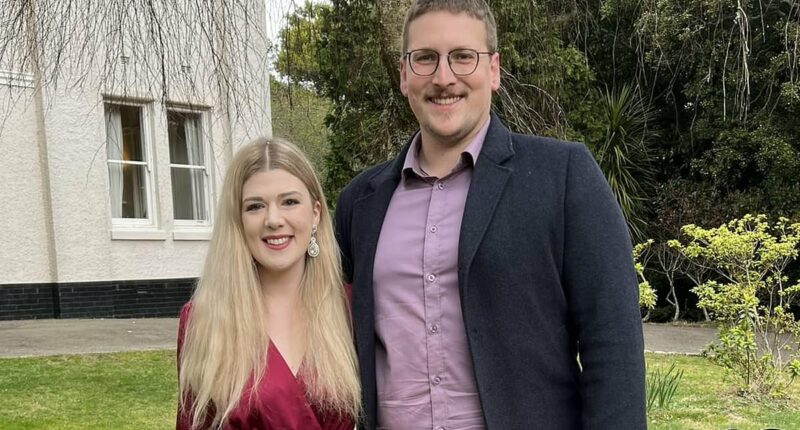Share this @internewscast.com
Every night, Emily Morton braces herself for just an hour of sleep, knowing that another day of intense pain and uncertainty lies ahead.
At the age of 26, Emily was thriving, managing a successful wedding cinematography business and working part-time as a marketing coordinator.
But after suffering what she initially thought was toothache, her life was turned upside down in the worst way possible.
Now, at 29, she endures a condition so severe it’s often referred to as the ‘suicide disease’—a condition that subjects sufferers to such unbearable agony that they contemplate ending their lives, and sadly, some do.
The pain started back in February 2022 after Emily experienced a bout of mild Covid.
She was getting ready for the day when she started to feel a ‘zapping’ sensation in her front right tooth.
She rushed to the dentist but after X-rays were taken, she was told there was ‘nothing wrong’.
‘I pleaded with the dentist to remove the tooth, but the tests revealed nothing was wrong. Then the pain spread to nearly all of my upper teeth,’ Emily, a resident of Adelaide, South Australia, shared with the Daily Mail.
To donate to Emily’s GoFundMe page, click here

Emily and her husband Andy Morton (pictured together) got married in November 2020 and were planning to start a family. However, their lives took a dramatic turn in February 2022 when Emily began suffering from what she believed was a simple ‘toothache’, but it turned out to be the dreaded ‘suicide disease’.
A few months later, Emily caught Covid again and began to experience what she describes as a ‘lightning storm’ of electric shocks in her face.
Over the next two years, she visited multiple specialists, searching for answers.
Eventually, she was diagnosed with a likely case of atypical trigeminal neuralgia—a condition causing intense facial and head pain considered by some to be worse than cancer.
When the pain in Emily’s mouth intensified, it spread rapidly to the rest of her teeth and she developed postural orthostatic tachycardia syndrome (POTS), extreme tinnitus, and brain fog.
POTS is a condition that affects the nervous system, causing an accelerated heart rate, light-headedness and fatigue.
‘My face buzzes and burns, my teeth feel electric, and chewing can set off nerve zaps. Something as simple as sharing a meal or chatting with a friend can leave me in agony,’ Emily explained.
‘It’s like my face is wired into a live electrical current – constantly burning, zapping, and buzzing that never lets up. It’s not just pain – it’s a full-body assault that hijacks my entire nervous system.
‘I have debilitating pain in all corners of my face, including stabbing, shooting, electric shocks, tingling and phantom water drop sensations in my nose, ears, cheeks and below my eyes, temples, jaw and chin,’ she added.

‘My face buzzes and burns, my teeth feel electric, and chewing can set off nerve zaps. Something as simple as a meal or talking to a friend can leave me in agony,’ Emily explained (pictured on their wedding day in 2020)
‘Hope is what gets me out of bed, and the support of my family.’
Emily and her husband Andrew had a once picture-perfect life. They got married in November 2020 and were hoping to buy a house, get a dog and have children one day.
But the couple are now ‘living a nightmare’ and their lives have been put on hold since 2022.
Emily struggles to eat, drink, relax, exercise and socialise.
Making matters worse, her particular condition is extremely rare because the pain is on both sides of her face. Trigeminal neuralgia is usually only on one side.
As a result, doctors are not confident enough to perform surgery or offer treatment due to the risk of the condition worsening.

Emily struggles to eat, drink, relax, exercise and socialise because of her condition
‘It may not be a terminal illness for me, but it’s a life sentence,’ Emily said.
‘It is like acid is being poured on your gums while simultaneously having ice cream on your teeth all day – all while they’re being smashed with a hammer.
‘My biggest struggle is the invisibility of the seriousness of what I am facing.
‘This has essentially stolen my whole identity and taken everything that gives [my] life meaning. I’ve been told that the research is decades away from finding a solution.’
In recent years, Emily has been trying to seek a more detailed diagnosis and cure.
Emily has travelled to Sydney, Melbourne and even Cyprus in a desperate bid to find a treatment that eases her pain. She has also tried various holistic approaches, but nothing has worked.
She was forced to stop working in 2023 and she and her husband moved out of their rental that same year.
Now they live with Emily’s mother. Andrew is her carer and they have both tried to gradually return to work, with Emily enrolling in a return to work program.

Emily developed a rare form of atypical trigeminal neuralgia – a nerve pain condition affecting the face and head – and suffers constant pain on her face, head and teeth (pictured before the diagnosis)

The pain is constant and has spread to most of her teeth, making even basic tasks like brushing or speaking extremely difficult
NEW PROCEDURES
Earlier this year, in August, Emily was booked in to have a MRI Guided Focused Ultrasound procedure in Victoria, which treats patients with disabling neurological conditions.
Focused ultrasound waves ablate the affected tissue, disrupting the abnormal brain activity and significantly reducing tremors.
But weeks before the procedure, physicians cancelled the appointment following careful consideration and the possibility that it might negatively impact her health.
‘The surgery was cancelled because my surgeons discovered, in the weeks leading up to my procedure, that patients with my skull density ratio aren’t considered suitable candidates,’ Emily explained.
‘They would have to turn the machine up very high to create the desired result and this posed a risk to my health.
‘We were devastated when we received the phone call, as we had booked accommodation and flights as a family and were so ready. Yet we are paradoxically so grateful that I was kept safe.’

‘It is like acid is being poured on your gums while simultaneously having ice cream on your teeth all day – all while they’re being smashed with a hammer,’ said Emily (pictured with her mother, siblings and husband)

Emily remains positive. She has found a clinic in Sydney that offers ‘extremely advanced neurostimulation procedures for intractable chronic pain’
Emily remains positive and refuses to give up hope that a treatment or cure will come along eventually.
The day after her appointment was cancelled, she renewed her search for another option. To her surprise, she found a clinic in Sydney that offers ‘extremely advanced neurostimulation procedures for intractable chronic pain’.
‘As an example, they are the first centre in the world that has introduced the use of combined brain motor and somatosensory stimulation for the treatment of very complex pain syndromes,’ Emily said.
‘They had me undergo an advanced MRI called connectomics mapping. It maps a person’s individual pain pathways in their brain to see what connections might be the culprit.’
She was also advised of another Sydney clinic that uses ‘personalised brain mapping to optimise transcranial magnetic stimulation targets for individuals suffering from mental health and other neurological conditions’.
‘Within one week, I went from all hope being completely eradicated, to learning of brand-new science and procedures that I never knew existed,’ she said.
‘It just goes to show how immeasurable suffering and hope can coexist.’
But cutting-edge treatment pathways come at a cost.
‘Whatever we choose will be significantly more expensive than the cost of the original surgery, so we face a very uncertain future, financially and medically,’ Emily said.
‘We are not alone: there are countless others that are in uncharted waters with post-viral issues. Though we often feel like we’ve been left behind by the world, we are still here.
‘We are still fighting. We still matter. And I will spend the rest of my life making sure no one ever feels alone in their circumstance.
‘I will also dedicate my life to advocating for cutting edge treatments to be made affordable and accessible for all Australians in need.
‘I have already reached out to several ministers in healthcare who have given me information about how I can best use my experiences to advocate for the Australian chronic illness community.’
To donate to Emily’s GoFundMe page, click here
If you or anyone you know is suffering, call Beyond Blue on 1300 224 636 or Lifeline on 13 11 14













